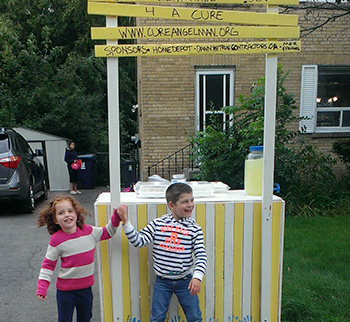TORONTO – Five-year-old Na’ama Uzan was bothered by the idea of doing nothing while funds are needed for research efforts to find a cure for Angelman syndrome, the neurogenetic disorder her older brother, Nadav, suffers from.
Last summer, determined to help raise money, Na’ama decided to have a lemonade stand for the cause, and her venture quickly snowballed into an extensive, community-wide fundraising initiative that has earned $19,000 to date. She now plans to raise more money with a hot chocolate stand on Jan. 29.
Na’ama’s parents, Ruchama and David Uzan, said that last year, they told Na’ama about the scientific measures being taken to treat Angelman syndrome, which causes Nadav, 6, to have epilepsy, makes it difficult for him to sleep and affects his speech and balance.
“We’d been talking about different ways people raise money and mentioned as an example how she’d had a lemonade stand the summer before, for herself,” Ruchama said. “And Na’ama said, ‘OK, let’s do [one] for this, too.’ We let her lead us.”
So last June, Na’ama set up a lemonade stand in front of the family’s home in the Bathurst Street and Lawrence Avenue area of Toronto, selling lemonade for 50 cents a cup and popcorn. At the end of the day, she’d made $100.
The profits were directed to the U.S.-based Foundation for Angelman Syndrome Therapeutics (FAST), whose focus is to try to find a cure for the syndrome.
From that day, the initiative “took off way beyond our wildest beliefs,” said David, who, like Ruchama, was “blown away” by their daughter’s sense of initiative.
“It was important to me to do this because it’s my brother who has [Angelman syndrome],” Na’ama said articulately over the phone. “His life is very, very, very hard.”
News of Na’ama’s lemonade stand rapidly spread among friends and acquaintances in the community, through both word of mouth and social media. Soon, others in the Jewish community were offering to host their own lemonade stands in support of the cause.
“It picked up to the point that once or twice a week, there would be a lemonade stand [to raise money for Angelman syndrome] in the area,” David said. “People really took ownership.”
The stands were usually held in or near the Uzans’ neighbourhood, but some were further away. They typically happened on Sundays or on weekday afternoons, and featured lemonade and kosher baked goods, including challahs, all made by friends or donated by local businesses.
They were amazed by people’s generosity. “People would say, ‘I’ll take a couple of lemonades,’ and then put $20 in the jar,” Ruchama recalled. “It was astounding. At one stand, we made $800.”
Several family foundations pitched in, as did corporate sponsor Gamma-Dynacare Medical Laboratories.
Home Depot also helped, donating wood to build sturdier lemonade stands. Then a local builder helped construct them and a group of neighbourhood children decorated them.
On Jan. 29, fundraising will resume: from 3:30 to 4:30 p.m., Na’ama will sell hot chocolate, coffee donated by Starbucks and various types of baked goods outside her family’s home.
“We’re obviously really proud of Na’ama’s sensitivity,” Ruchama said. “This has tumbled into something so enormous… When I was five, I wasn’t doing anything like this!”
David also expressed awe at their daughter’s accomplishments, saying, “Everything, from Na’ama’s understanding, to her initiative, to her love of her brother, to her drive and articulateness – we’re just in disbelief.”
To participate in or donate to the hot chocolate stand, contact the Uzan family at [email protected].
The Facebook page for this initiative is www.facebook.com/ASlemonadestand.
For more information about FAST, visit www.cureangelman.org.
